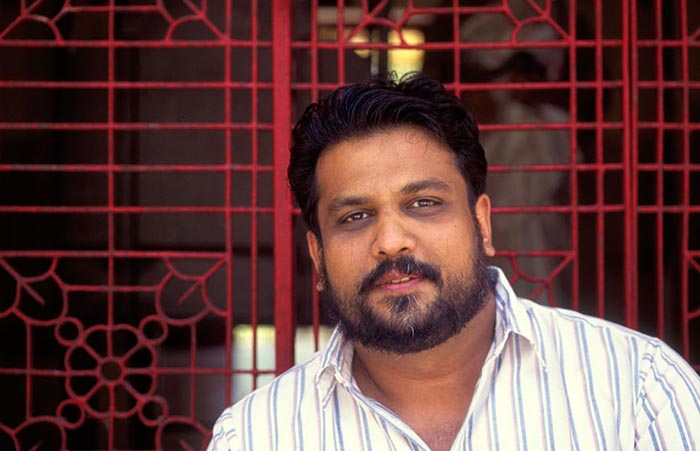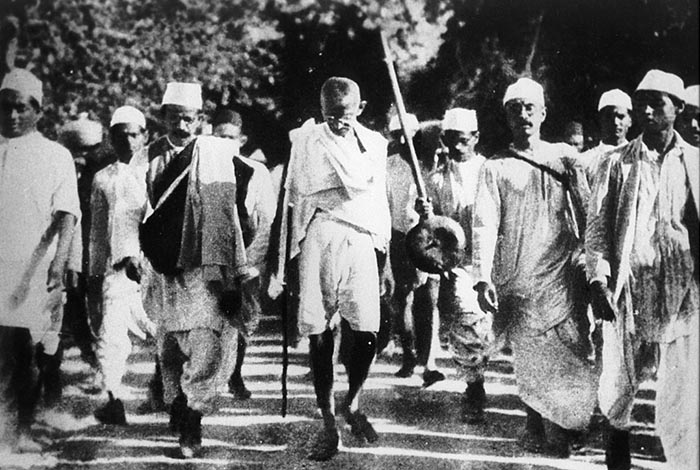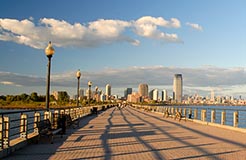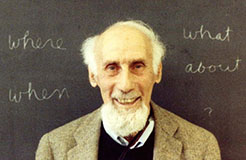News & Views
With Tushar Gandhi In Mumbai
by Robert Hirschfield

Tushar Arun Gandhi, son of journalist Arun Manilal Gandhi, and great grandson of Mahatma Gandhi, at his Mumbai apartment. Photograph: Dinodia Photos [/] / Alamy Stock Photo
I expected the great grandson of the Mahatma to be thin, to have the beginnings of the old man’s face of saintly collapse. But Tushar Gandhi [/], who greeted me at the door of his spare ground floor flat in Santa Cruz, near the Mumbai airport, had the beefy, bearded face of a football linesman. A face that looked eager to escape its name.
Looking around, I thought I’d find a picture of Gandhi somewhere, but found instead a quiet yellow painting of Kasturba, Gandhi’s wife, at her spinning wheel. Symbol of Indian simplicity and self-sufficiency. Hard not be moved by it after the two-hour crawl of Mumbai traffic.
At one point, Tushar’s slender teenage daughter in hip-hugging blue jeans came in to ask her father for money. He dug into his pocket obediently. I could have been in the home of any ordinary middle class Indian family.
Tushar Gandhi, in his mid-fifties, was a devotee in his youth of John Wayne. (“I thought the quick draw was the solution to every problem.”) As an adult, he has become one of the family’s most visible proponents of nonviolence.
“My following Gandhi had nothing to do with genetics. My father said, ‘Don’t accept Gandhi because I accept him. Study him and decide for yourself.’ I read everything Gandhi wrote, and came to the conclusion that only through nonviolence do human beings have a future.”
Tushar’s father, the writer and journalist Arun Manilal Gandhi [/], gave me his son’s email address before I left for India. I had written about Arun’s visit to the West Bank, where large crowds of Palestinians, devout Muslims among them, turned out to hear a Hindu urging them to resist the Israeli occupation with unrelenting nonviolence. (For one of Robert’s articles on this visit, click here [/] It made me think of the enduring mystique of the Gandhi name that has lost much of its significance in today’s India.
Tushar informed me that Gandhi wanted his Congress Party to include adherence to nonviolence in its manifesto. “Party leaders balked at the idea. For them, nonviolence had been just a convenient method of getting independence. It was like medicine that passed its use-by date.”
I thought that a particularly apt image for this man who travels around India dispensing his great grandfather’s medicine, for which there are few takers. He was undeterred. In 2005, on the seventy-fifth anniversary of Gandhi’s Salt March, he re-enacted the 235 mile trek from the Mahatma’s Sabarmati Ashram in Gujarat to the sea at Dandi, where the Indian leader had his marchers make salt in defiance of the British monopoly on Indian salt manufacture.
Tushar wrestled with his generation the way dissidents traditionally do. He hated Congress, but he voted for Congress, fearing the hardline nationalist alternative. He conformed, I was sad to discover, to the politics of bad choices, just as we do here in the US.
It energised him, he said, to bring his message to the young. “We have lost our today,” he told me, “but we haven’t lost our tomorrow.” Young Indians will ask him about terrorism, about nonviolence in the age of terror. “They will ask me, ‘How do you disarm a suicide bomber nonviolently?’ They don’t ask, ‘What turns a human being into a suicide bomber?’”
He asks them to imagine a reality where death is considered preferable to life. A reality of irreconcilable grievances, irreconcilable resentments. “I say to them, ‘You can stop a terrorist with a bullet, but you can’t stop terrorism with a bullet.’”
It was the great man’s voice I was hearing.

Mahatma Gandhi leading the famous 1930 Salt March. The twenty-four day march covered 235 miles, and marked the start of the campaign to end British rule of India. It is one of the most famous examples of what Gandhi called satyagraha (nonviolent resistance). He wrote: “If the means employed are impure, the change will not be in the direction of progress but very likely in the opposite. Only a change brought about in our political condition by pure means can lead to real progress” (For more, click here [/] Photograph: Wikimedia Commons
Robert Hirschfield is a New York-based free-lance writer and poet who has published many profiles of contemporary poets as well as stories on nonviolence activists in the Middle East, India, Nepal and the US. His work has appeared in Teachers & Writers Magazine, Tricycle, The Writer, The Jerusalem Report, Sojourners and other Publications. He has had two article published in Beshara Magazine:
More News & Views
Introducing… ‘Perfect Days’ and ‘Nowhere Special’
Jane Clark watches two films with a contemplative theme
Irreducible: Consciousness, Life, Computers and Human Nature
Richard Gault reviews a new book by one of the leading lights of the science of consciousness
An Irish Atlantic Rainforest
Peter Mabey reviews a new book by Eoghan Daltun which presents an inspiring example of individual action in the face of climate change
In Memory of Bill Viola (1951–2024)
Jane Carroll pays tribute to the acclaimed video artist, who died on July 12th 2024
Bringing More Land Back to Life
Luci Attala gives an update on the Kogi’s exciting regeneration project, Munekan Masha, in Colombia
Wild Service: Why Nature Needs You
Charlotte Maberly reviews a new book that argues that it is only by including human beings in nature that we can preserve it
FOLLOW AND LIKE US
——————————————
——————————————
——————————————
If you enjoyed reading this article
Please leave a comment below.
Please also consider making a donation to support the work of Beshara Magazine. The magazine relies entirely on voluntary support. Donations received through this website go towards editorial expenses, eg. image rights, travel expenses, and website maintenance and development costs.
READERS’ COMMENTS
7 Comments
Submit a Comment
FOLLOW AND LIKE US


Absolutely… Ultimate Insights… for just as “The pen is mightier than the sword” (Edward Bulwer Lytton) so a meal is mightier than a missile.
“HERE with a Loaf of Bread beneath the Bough,
A Flask of Wine, A Book of Verse-and Thou
Beside me singing in the Wilderness-
And Wilderness IS Paradise e’NOW”
From the Ruba’iya’t of Omar Khayya’m as translated and adapted by Edward FitzGerald
Short but so sweet.
A taste of history
“My following Gandhi had nothing to do with genetics. My father said, ‘Don’t accept Gandhi
Tushar Gandhi was very much his own man, and not tied to any mythological ideas about
his great grandfather. He was most interested in how nonviolence could be applied in the
world. In Mumbai, he belonged to a Palestinian support group, but opposed their
being against Israel’s violence while supporting Palestinian violence against Israel.
While admitting the struggle was unequal, and Israel unjust, armed violence itself was an’
inherent evil, and should be equally condemned.
It energised him, he said, to bring his message to the young. “We have lost our today,” he told me,
Tushar Gandhi, in his mid-fifties, was a devotee in his youth of John Wayne.